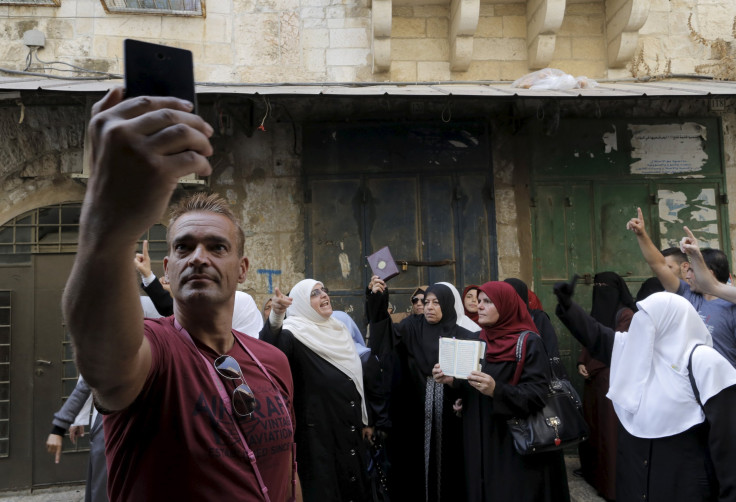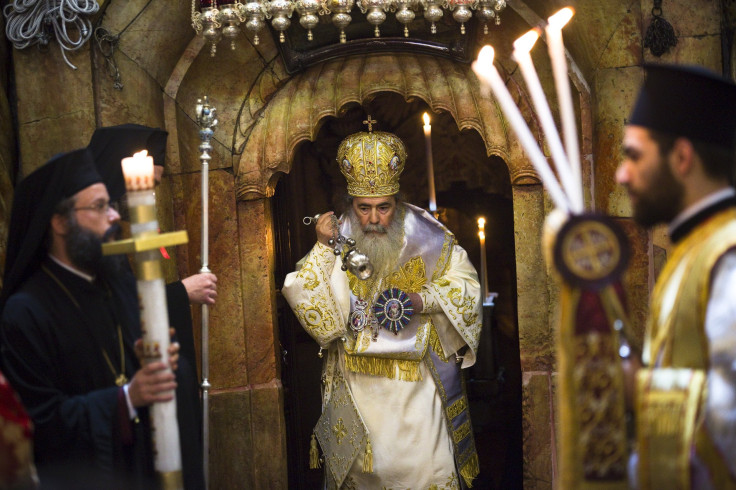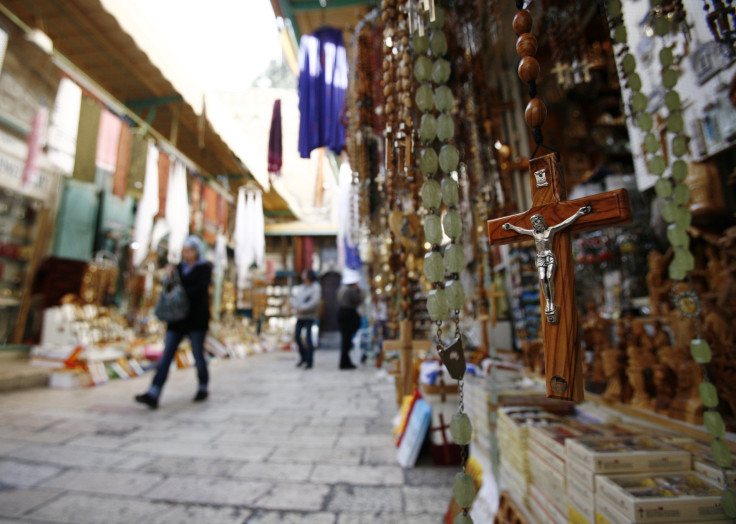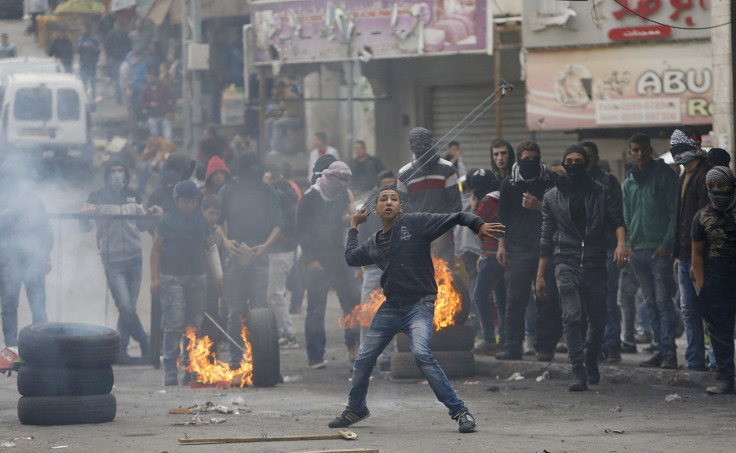Israel Palestine Violence Will Hurt Christmas Winter Travel? Recent Tensions Stir Concern Among Already-Hurting Tourism Sector

Barbara Shaw's livelihood depends on the thousands of tourists who stop by her quaint Jerusalem gift shop each year. Just a 15-minute walk from the old city, where bustling and colorful markets sprawl with sightseers and religious pilgrims, Shaw sells an array of quirky aprons, baby onesies and mugs and t-shirts with funny sayings.
But business has been particularly slow these days. The city, considered holy by Muslims, Christians and Jews, has been gripped by heightened political and religious violence, and her sales have dropped about 10 percent, she estimated.
"Naturally the situation does impact all businesses," she said, "but you've got to have thick-skin in business anyway. You ride things through."
A series of stabbings over the last month have stirred concern among many in an already-hurting tourism sector in both Israel and Palestine that this winter could be a rough season. Tourism contributes upwards of $11 billion to the Israeli economy, and Christmas is a particularly important season as the city fills with tourists excited to trace Jesus' steps. Tourism experts said many prospective travelers seemed to be holding off on canceling or postponing their trips, but businesses were already beginning to notice an impact.
“At the present we’re doing fine but we’re worried about the future,” said Benny Olearchik, deputy general manager of Jerusalem’s famed King David Hotel. “Usually during this time we get requests or reservations for November or the winter, and that's slowed down."

Stabbings over the last month have led to at least seven Israeli deaths, many of them in the old city of Jerusalem, a hub for tourists. The area is popular for its religious holy sites: a massive church that marks where Christians believe Jesus was resurrected, a site where Jews worship at what remains of a stone retaining wall of two ancient temples and a holy mosque where Muslims believe the Prophet Muhammad once ascended to heaven and met with God. The city's cobblestone streets are lined with souvenir shops selling hand-loomed scarves and religious trinkets and restaurants that serve falafel sandwiches and other Middle Eastern dishes.
A hub for the three Abrahamic religions, Jerusalem has been the center of protests that have broken out between Palestinians and Israeli security forces at the contested al-Aqsa mosque, and have spilled across Israel and the Palestinian West Bank in recent weeks. Clashes have been marked by rock throwing, rioting and arson, as some 40 Palestinians have been killed. In parts of the city, Palestinian protesters have rolled burning tires and thrown molotov cocktails at cadres of police, as security forces have responded with rubber bullets and stun grenades.
"We assume people are waiting on the fence to see how things go in the next few weeks," Olearchik, whose hotel has seen just a few cancelations so far, said.
Greg Reilly, the general director of Maranatha Tours, a Phoenix, Arizona-based tour group that leads Christian pilgrims to Israel, said customers have expressed safety concerns in recent weeks. A handful of people have canceled their reservations, but Reilly said the overall impact has so far been minimal. Reilly was himself preparing to accompany a group to Israel this weekend, as they planned also to travel to the Palestinian West Bank, which has seen clashes that have led to hundreds of injuries in recent weeks.

"I feel safer there than I do going to Chicago," Reilly said. "In our market, we do Christian pilgrimage to the Holy Land, and for the most part, the Christian population believes God’s in control."
Data was not yet available for whether the recent wave of attacks has affected September or October tourism, but in the past, tourism has generally dropped during and in the aftermath of upticks in violence, a study by the Bank of Israel found. Hotel stays by foreign visitors are still 10 percent lower than two years ago, signaling the tourism sector has not yet completely recovered from the 2014 summer war in Gaza, according to the Jerusalem Post. The tourism industry contributes to about 5 percent of Israel's economy.
Tourism to Israel is unique in that prospective tourists tended to be more aware of the situation on the ground, said Alan Fyall, a tourism marketing professor at the University of Central Florida. Whereas one major attack that targeted a beach resort in Tunisia last summer decimated the country’s tourism industry, travelers have continued mostly unabated into Israel despite decades of conflict. Each year, some 3 million tourists flock to the country from all around the globe to float atop the Dead Sea and see where prophets were believed to have preached.
“Normally, when you get negative situations, when you get situations of political unrest, it always has an impact on tourism,” Fyall said. "One could argue it’s not good at the moment, it’s been better, but the issue is always there. I’m sure numbers will be impacted, but as to the degree, it’s probably a little early to say.”
The U.S. State Department has not yet issued a travel advisory regarding the recent spate of attacks, but U.S. officials continued to urge caution when traveling to the region and particularly to areas known for clashes. Some hotel managers said they were cautioning guests against traveling without a reputable tour guide to the Old City of Jerusalem, where knife attackers have lunged at random passersby.
Uri Steinberg, Israel’s tourism commissioner for North America, said in a statement that they considered travel to Israel completely safe. But there were signs that Israel's tourism ministry was concerned about the effect perceived instability could have on tourism. The ministry recently teamed up with Groupon to sell discount vacation packages to Americans for as low as $1,000 that include airfare, tours, meals and a seven-day hotel stay. The move was meant to counter perceived dangers in the country.
"When you shout, 'Crisis, crisis,' it only intensifies the external crisis and makes people hesitate whether to come to Israel," said Yariv Levin, the country’s tourism minister, according to Fast Company. "When they see that we keep marketing Israel as usual, it projects business as usual."
Many people blamed an overly-sensational media for causing unnecessary panic over travel to the region. While there has been a sharp rise in violence, they said that much of it has occurred in specific areas and was easy to avoid. Simon Davit who works at Grand Park Hotel in Bethlehem, believed to be the city of Jesus' birth, said Christmas tourism was likely to depend on whether violence continued to spread in the coming weeks, and said the media was unhelpful in portraying an accurate image of the region. Images lately have shown Bethlehem's streets -- often busy with tourists -- smoky with tear-gas and flooded with Israeli soldiers.

Bethlehem's shops sell Christian ornaments and gifts year-round, and each winter, Palestinian sellers hope for a successful Christmas season. A massive concrete, graffiti-covered security wall erected by Israel about a decade ago and a reputation for violence has cut off much tourism to the city. Many Western travelers fear visiting Bethlehem, although it has been considered generally safe for travel for years. During last summer's war in Gaza, Davit's hotel had to lay-off more than a dozen workers due to a sharp decline in profits.
"I think if the violence continues and the media keeps on the same propaganda about it not being safe... people would stop coming here," he said. “If the Gaza militants start [firing] missiles to Israel, I think tourism will stop immediately.”
But while Fyall said conflict was likely to drive away many travelers, it was also likely to appeal to some of the more adventurous tourists. In the West Bank, tourism agencies often offer guided conflict tours, and tourists frequently visit Bethlehem's densely-populated and impoverished refugee camps or the old city of Hebron, where Israeli soldiers patrol the streets and checkpoints block the pathways.
“Disaster and chaos attract human curiosity and that leads to tourism,” Fyall said. “If you have a car crash on the other side of the road, everyone stops to see it."
© Copyright IBTimes 2024. All rights reserved.






















